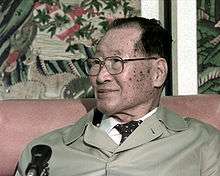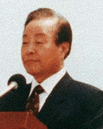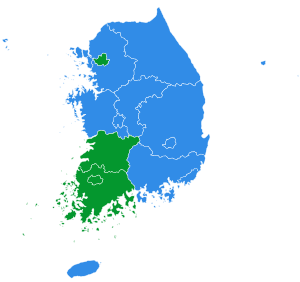South Korean presidential election, 1992
| | |||||||||||||||||||||||||||
| |||||||||||||||||||||||||||
| |||||||||||||||||||||||||||
|
| |||||||||||||||||||||||||||
| provinces and cities majority won by ■ – Kim Young-sam ■ – Kim Dae-jung | |||||||||||||||||||||||||||
| |||||||||||||||||||||||||||
The 14th South Korean presidential election took place on 18 December 1992. This was the second democratic election since 1987. The voter turnout was 81.9%.
Background
On 22 January 1990, two opposition leaders Kim Young-Sam and Kim Jong-Pil led their parties to merge into the ruling party Democratic Justice Party, and formed the Democratic Liberal Party, led by President Roh Tae-woo. Before they merged, Roh's party did not have a majority in the National Assembly. After they merged, they had over a two-thirds majority, which could pass bills without any obstruction from the opposition.
In 1992, Hyundai businessman Chung Ju-yung also ran in the election.
Results
The right-wing conservative Democratic Liberal Party presidential candidate Kim Young-Sam won the presidential election, defeating opposition Democratic Party leader Kim Dae-Jung, marking the third time he had lost a presidential election. Kim later announced his retirement from politics.
The conservative party won the election continued to govern until 1997, when Kim Dae-Jung won the election.
| Candidate | Party | Votes | % of Votes | |
|---|---|---|---|---|
| Kim Young-sam | Democratic Liberal Party (민주자유당) | 9,977,332 | 42.0% |  |
| Kim Dae-jung | Democratic Party (민주당) | 8,041,284 | 33.8% |  |
| Chung Ju-yung | United People's Party (통일국민당) | 3,880,067 | 16.3% |  |
| Park Chan-jong | New Politics Reform Party (신정치개혁당) | 1,516,047 | 6.4% | |
| Baek Gi-Wan | Independent | 238,648 | 1.0% | |
| Kim Ok-sun | Independent | 86,292 | 0.4% | |
| Lee Byeong-ho | Korean Justice Party | 35,739 | 0.22% | |
| Invalid ballots | 319,761 | 0.6% | ||
| (Total electorate: 29,422,658 - Turnout rate: 81.9%) Total | 24,095,170 | 100% | ||
| provinces · cities |  |
.jpg) |
 | |||
|---|---|---|---|---|---|---|
| Kim Young-sam DLP |
Kim Dae-jung DP |
Chung Ju-yung UPP | ||||
| Votes | % | Votes | % | Votes | % | |
| Seoul | 2,167,298 | 36.4% | 2,246,326 | 37.7% | 1,070,629 | 18.0% |
| Busan | 1,551,473 | 73.3% | 265,055 | 12.5% | 133,907 | 6.3% |
| Daegu | 690,245 | 59.6% | 90,641 | 7.8% | 224,642 | 19.4% |
| Incheon | 397,361 | 37.3% | 338,538 | 31.7% | 228,505 | 21.4% |
| Gwangju | 14,504 | 2.1% | 652,337 | 95.8% | 8,085 | 1.2% |
| Daejeon | 202,137 | 35.2% | 165,067 | 28.7% | 133,646 | 23.3% |
| Gyeonggi | 1,254,025 | 36.3% | 1,103,498 | 32.0% | 798,356 | 23.1% |
| Gangwon | 340,528 | 41.5% | 127,265 | 15.5% | 279,610 | 34.1% |
| Chungcheongbuk | 281,678 | 38.3% | 191,743 | 26.0% | 175,767 | 23.4% |
| Chungcheongnam | 351,789 | 36.9% | 271,921 | 28.5% | 240,400 | 25.2% |
| Jeollabuk | 63,175 | 5.7% | 991,483 | 89.1% | 35,923 | 3.2% |
| Jeollanam | 53,360 | 4.2% | 1,170,398 | 92.2% | 26,686 | 2.1% |
| Gyeongsangbuk | 991,424 | 64.7% | 147,440 | 9.6% | 240,646 | 15.7% |
| Gyeongsangnam | 1,514,043 | 72.3% | 193,373 | 9.2% | 241,135 | 11.5% |
| Jeju | 104,292 | 40.0% | 85,889 | 32.9% | 42,130 | 16.1% |

.png)
.jpg)
